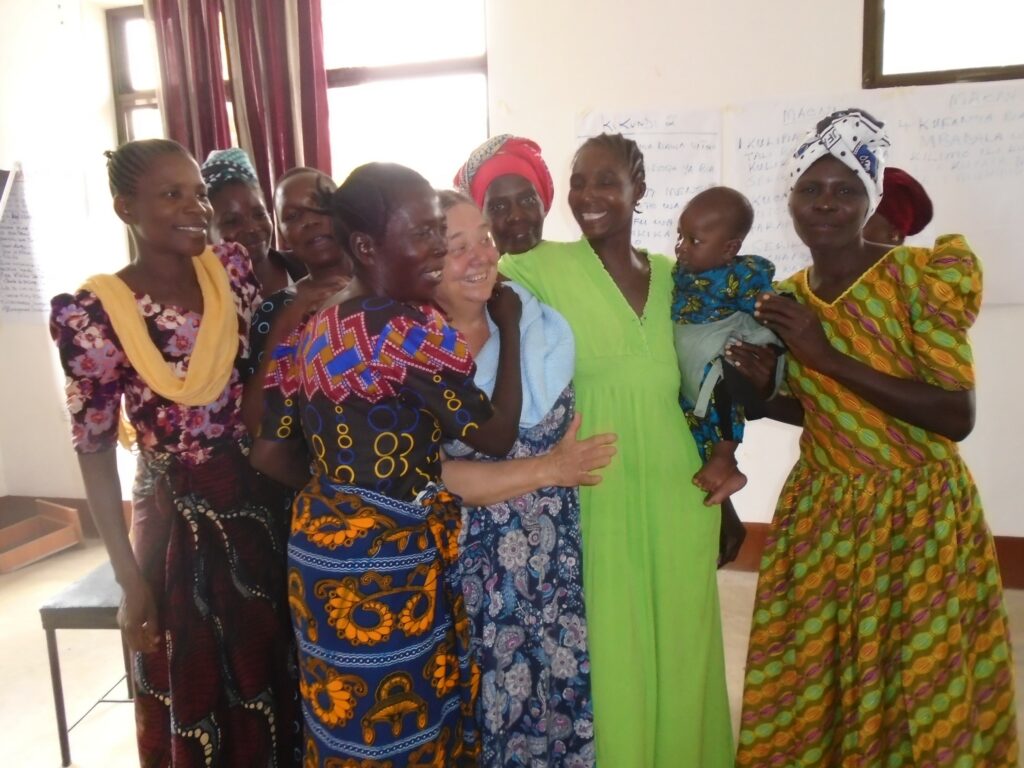Reports
FAMILY SUPPORT PROJECT – WOMEN’S CONFERENCE REPORT
The conference took place at the Red Cross building in Mwanza on 29th November 2019. Over 30 people attended, representing women’s groups in Igombe town and Chole village, Bukumbi Hospital, Common Destiny for Human and Development Aid Foundation (CODEHDAF) and Busega Scotland.
The event was co-hosted by Julieth Godwin of Busega Scotland and Paul Mashimba from CODEHDAF. A conference record was kept by Kabula Peter. There were presentations by:
Stella Ndallo & Alphonce Kagezi on the groups in Igombe
Henry Zepherine on the Chole groups
Sr Anastasia Salla on health education and insurance
Community Development Officer Devis, the keynote speaker, from Ilemela District Council who described the role of the government in supporting women’s groups.
The conference had four objectives:
1. To celebrate what has been achieved.
2. To allow the women to share their experiences and ideas.
3. To learn lessons.
4. To plan future work.
All four groups reported improved circumstances for their families, despite government restrictions on fishing and charcoal making, that affects the local economy, and price rises of staple foods. The establishment of Vicobas (village community banks) allows loans to be taken for business growth and other financial needs. The capital held by each group has increased significantly.
The Chole women have benefitted from horticultural inputs provided by CODEHDAF.
The value of the health education was noted by all groups and the health insurance at Bukumbi Hospital was beneficial to the families in Chole. Unfortunately, the hospital is small and cannot provide all services and so the insurance is not comprehensive. The hospital has made losses on the scheme, having small premiums but high demand.
Representatives from both Igombe and Chole said that need exists in their communities to start new groups (over 120 families have been involved so far). There is a new government health insurance scheme (introduced on 1st January) that may be useful to Igombe women and provide a possible alternative in Chole.
Local government can provide registered groups with interest-free community development loans to build up capital and increase lending. The government loan must be repaid in 12 months.
The conference was very helpful in showing:
1. What the groups have achieved has been beneficial.
2. Further thought is needed on how health insurance is provided and paid for.
3. New groups should be government registered, and build their capital, as quickly as possible to take advantage of community development loans.
4. There is value in continuing the programme.
The conference was sponsored by the Goat Race charity in Dar es Salaam.
John Carney
18.1.20
BUSEGA SCOTLAND ANNUAL REPORT JANUARY 2018
Prepared for the Annual General Meeting on 25th January 2018
Busega Scotland became a Scottish Charitable Incorporated Organisation on 4th November 2015. This second annual report covers the period from 1st December 2016 until 30th November 2017.
The charity is based in Moray and works in partnership with non-governmental organisations and local government in Tanzania, supporting three main projects:
Family Support
Mayega Children’s Centre
Moving-on Project
The projects are based in the Mwanza and Simiyu Regions of Tanzania.
The purposes of Busega Scotland are:
The prevention or relief of poverty
The relief of those in need because of age, ill-health, disability, financial hardship or another disadvantage
The advancement of health
The advancement of education
The advancement of citizenship or community development
The purposes are achieved by addressing the assessed needs of disadvantaged Tanzanian communities, through setting-up and managing projects and by making grants, and where appropriate loans, to individuals, or charitable associations, bodies and organisations in Tanzania.
Acknowledgements
Busega Scotland wishes to record its thanks for the many contributions made to its work by trustees, volunteers, supporters, charities, businesses, churches and organisations in Scotland, Tanzania and other countries. Without this support the purposes of the organisation would not be achieved. Support is given in many ways; financial donations and benefit in kind, organising events and providing advice, guidance, time and expertise.
Busega Scotland believes that it is important to make a positive contribution to its host community of Moray and has undertaken project work with Aberlour Child Care Trust, Knockando Woolmill Trust, Lhanbryde Primary School, the Rotary Club of Elgin and Moray College UHI – University of the Highlands and Islands.
Busega Scotland has nine trustees. This number has not changed during the period of this report. Busega Scotland has no paid staff in the UK but pays allowances to nine Tanzanian staff, working in the three projects. In 2016-17 seven British people visited Tanzania to support the project work. Overseas volunteers are self-funding.
Projects in Tanzania
Family Support – provides extremely poor families with opportunities to improve their life chances. The project is operating in two locations, supporting about one hundred and five families, providing business grants and loans, health insurance and assisting three women’s groups. The original project is based on the fishing industry in the town of Igombe and the new projects support agriculture in the village of Chole. A Baby Bundles scheme has commenced in partnership with Bukumbi Mission Hospital. It is based on the Scottish Baby Boxes concept and is supporting the most vulnerable mothers and babies.
Mayega Children’s Centre – is a children’s home for vulnerable children and young people in dormitory accommodation. There are currently twenty-three residents. The children at Mayega are assured of a caring environment and their needs are met in terms of food, clothing, health and education. In 2016-17 two young people left Mayega and joined the Moving-on Project and nine children of nursery and primary school age have been admitted. A Saturday teacher has been appointed to improve educational attainment.
Moving-on Project – provides accommodation, social, emotional, practical and educational support for young people, who have completed their education and left the Mayega Children’s Centre. Two young people joined the project in January 2017. In total, there are now eight young people in college, following vocational courses in domestic electrical installation and motor mechanics. The aim of the project is to support the transition from care to independence and employment.
Finance
Busega Scotland has supported the three Tanzanian projects by fundraising in many ways. There have been events (e.g. sponsored events, a concert and quiz nights), a pop-up charity shop, one-off and regular donations from individuals and groups.
Local costs have been minimised, and comprised mainly of expenses for fundraising activities and charges for money transfer to Tanzania.
Funds are transferred to Tanzania in accordance with need at any given time. Transfers are sanctioned by Busega Scotland in consultation with Tanzanian colleagues. Expenditure varies month by month.
There has been some success in raising funds in Tanzania itself with one charity aiding Family Support and a business supporting Mayega Children’s Centre. One UK charity has made a significant donation to the Moving-on Project.
Busega Scotland trustees receive financial reports, covering UK and Tanzanian income and expenditure and trends against budget. The Busega Scotland accounts will be submitted for independent review in accordance with the requirements of the Scottish Charity Regulator. They will then be published on the Busega Scotland website.
Challenges and Opportunities
As with any charitable organisation there is a need to maintain and expand fundraising.
Care is taken to communicate Busega Scotland’s positive impacts on lives in Tanzania, to inform supporters and maintain their loyalty. Communication is by newsletters, presentations and through a website and Facebook page.
Talks have been given to a variety of different groups, to raise the profile of Busega Scotland and the work it undertakes. These will continue.
There has been progress with the financial model adopted by Busega Scotland – to seek recurrent donations to underpin day to day project expenditure, while fundraising for capital and larger costs. Such major expenditure is only sanctioned when the funding is in place.
In 2018 there will be a greater emphasis on seeking funds from grant-making bodies and new sources of income will be developed, in Tanzania and UK. Local costs will continue to be kept to a minimum, so maximising the funds available for use in Tanzania.
Operational priorities have been agreed for the Tanzanian projects in 2018 and these include:
Family Support – support the second women’s group at Chole by increasing the capital available for business loans and to expand the Baby Bundles project.
Mayega Children’s Centre – a plan has been agreed to install a piped water supply and to develop a kitchen garden. Five new children will be admitted.
Moving-on Project – establish the four new students in their college courses and later assist seven college graduates in finding employment.
Conclusions
The second year of operation of Busega Scotland has been a success. The charity has grown its profile and has supported many vulnerable people and families in Tanzania.
It is addressing and achieving its charitable purposes. Its finances are well managed and are reported in detail to trustees.
Productive methods of partnership working have continued in two vastly different working environments. The charity has created positive collaborations, in achieving both its charitable purposes and in adding to the social, educational and cultural life of Moray.
The positive impacts in Tanzania are communicated to trustees, supporters and the public in a very direct and accountable manner. Press coverage continues to be good and the charity’s work was recognised by an invitation to the Queen’s Garden Party in Edinburgh. Busega Scotland is a credible and respected charity at home and overseas.
John Carney, Chair of Busega Scotland, 27th December 2017
——————————————————————————————————————————————
Moving on in safety and security June 2017
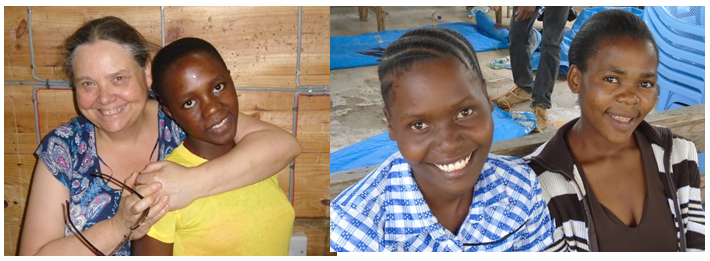 It is sobering to think that in Africa it is not difficult for children to find themselves living alone on the streets. The reasons are well known; grinding poverty and family breakdown, parental death and next to no social services. What is less well known is that the ‘lucky’ children brought up in children’s homes often find themselves back on the streets as young adults. Without family support there is little or no alternative.
It is sobering to think that in Africa it is not difficult for children to find themselves living alone on the streets. The reasons are well known; grinding poverty and family breakdown, parental death and next to no social services. What is less well known is that the ‘lucky’ children brought up in children’s homes often find themselves back on the streets as young adults. Without family support there is little or no alternative.
Busega Scotland’s Moving-on Project is available to young people leaving Mayega Children’s Centre, to help secure their futures. We are currently providing vocational training, housing, practical, social, emotional and spiritual support to eight young people and two other young women who have recently graduated, as a secretary and primary school teacher.
We would like to tell you about the three girls in our project – Kabula the secretary, Ester the teacher and Monica the student electrician. All three arrived at Mayega primarily through poverty; no food at home, no chance to go to school and families having to give the children up because they had no choice.
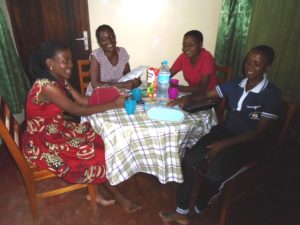
For this report, Kabula, Ester and Monica were interviewed by Julieth Godwin, Busega Scotland’s Assistant Project Leader in Tanzania, and herself a former street child. Like all young people they have their own hopes for the future and here is what they said.
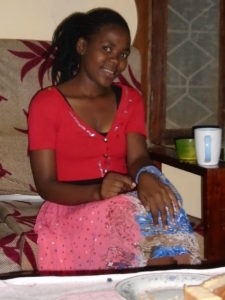 Kabula: When I was living at the (Mayega) centre I began to realise that there were a lot of people struggling like our family and I thought that when I grow up it will be my duty to contribute to others in need. From my heart I would like to thank Busega Scotland for their support. It has really helped me a lot. I hope my family are proud of me when they see me now and I am on the way to have a job, so I can be independent. I will never forget to thank Busega Scotland for what they did for me and continue to do for other children.
Kabula: When I was living at the (Mayega) centre I began to realise that there were a lot of people struggling like our family and I thought that when I grow up it will be my duty to contribute to others in need. From my heart I would like to thank Busega Scotland for their support. It has really helped me a lot. I hope my family are proud of me when they see me now and I am on the way to have a job, so I can be independent. I will never forget to thank Busega Scotland for what they did for me and continue to do for other children.
Ester: After finishing Form 4 I moved for the first time to Mwanza. It wasn’t easy for me in the city.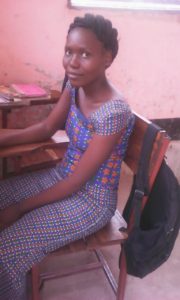 Everything was new. I had been more than 10 years at Mayega and had never moved around. It is hard to live in the community when everything is new. Not just living but going to college. It took a long time to get to know people. I thank God that after three years in Mwanza I have made some friends and understand that I am not a child anymore and can be with lots of different people. I would like to congratulate Busega Scotland for recognising the importance for children to have an education and other important needs; treatment, food and staff to support them.
Everything was new. I had been more than 10 years at Mayega and had never moved around. It is hard to live in the community when everything is new. Not just living but going to college. It took a long time to get to know people. I thank God that after three years in Mwanza I have made some friends and understand that I am not a child anymore and can be with lots of different people. I would like to congratulate Busega Scotland for recognising the importance for children to have an education and other important needs; treatment, food and staff to support them.
Monica: My family was very poor and often we had no food. They could not send me to school and did not know that education was important. In my head I hoped one day to go to school and said to myself that when I get the opportunity to get an education I will go back to my village and start some development programme there. Perhaps I can build a school, which will help my village know that education is important. All the girls in the village were getting married at about 14 years old. School was not important at all. I wanted a different life and I hoped that I could do something to help my family get out of poverty.
I have been at college since January. I am progressing well but I feel like a stranger because everything is new in my eyes. I had never been to a city before and Mwanza is very different from the village. Sometimes I feel too shy to speak with other people. I need to develop confidence to speak with people, even at the college so that they can help me to progress well. I thank Busega Scotland for supporting me. I will become a person who will be respected in the community because of having a good job. I hope and promise to study very hard to become an electrician.
How brave it is for the girls to share their thoughts with us. Some of their experiences are those of young people in Scotland but some are so different. It will cost Busega Scotland £1800 to help Monica through college and to realise her dreams. Dare we ask? Are there any readers who can help us to help her?
BUSEGA SCOTLAND ANNUAL REPORT 2016-2017
Prepared for the Annual General Meeting on 1st February 2017
Introduction
Busega Scotland became a Scottish Charitable Incorporated Organisation on 4th November 2015. This report covers the period from registration until 31st December 2016. It is Busega Scotland’s first annual report. The charity is based in Moray and works in partnership with non-governmental organisations and local government in Tanzania, supporting three main projects:
Family Support Project
Mayega Children’s Centre
Moving-on Project
The projects are based in the Mwanza and Simiyu Regions of Tanzania.
- The purposes of Busega Scotland are:
- The prevention or relief of poverty
- The relief of those in need by reason of age, ill-health, disability, financial hardship or other disadvantage
- The advancement of health
- The advancement of education
- The advancement of citizenship or community development
The purposes are achieved by addressing the assessed needs of disadvantaged Tanzanian communities, through setting-up and managing projects and by making grants, and where appropriate loans, to individuals, or charitable associations, bodies and organisations in Tanzania.
Acknowledgements
Busega Scotland wishes to record its thanks for the many contributions made to its work by trustees, supporters, businesses, churches and organisations in Scotland, Tanzania and other countries. Without this support the purposes of the organisation would not be achieved.
Support is given in many different ways; financial donations and benefit in kind, organising events and providing advice, guidance, time and expertise.
Busega Scotland believes that it is important to make a positive contribution to its host community of Moray and has project work underway with Aberlour Child Care Trust, Knockando Woolmill Trust, Lhanbryde Primary School, the Rotary Club of Elgin and Moray College UHI – University of the Highlands and Islands.
At its registration Busega Scotland had ten trustees. Two trustees have since resigned and another has been appointed.
Busega Scotland has no paid staff in the UK but pays allowances to seven Tanzanian staff, working in the three projects. In 2016 two British couples visited Tanzania to support the project work. Such overseas volunteers are self-funding.
Projects in Tanzania
Family Support Project – provides extremely poor families with opportunities to improve their life chances. The project is operating in two locations, supporting about seventy families, providing business grants and loans, health insurance and assisting two women’s groups. The original project is based on the fishing industry in the town of Igombe and the new project, which started in November, supports agriculture in the village of Chole.
Mayega Children’s Centre – is a children’s home for up to twenty-four vulnerable children and young people in dormitory accommodation. There are currently fourteen residents, as older members have moved to the Moving-on Project. The children at Mayega are assured of a caring environment and their needs are met in terms of food, clothing, health and education. In 2016 a second building was completed. This has a community room for dining, schoolwork and social activities. The physical security of the site was also improved by erecting a perimeter fence.
Moving-on Project – provides accommodation, social, emotional, practical and educational support for young people, who have completed their secondary education and left the Mayega Children’s Centre. Five young people joined the project in 2016. In total, there are now seven young people in college, following vocational courses in primary teaching, secretarial studies and motor mechanics. The aim of the project is to support the transition from care to independence and employment.
Finance
Busega Scotland supports the three Tanzanian projects by fundraising in many different ways. There have been events (e.g. a sponsored walk and quiz nights), a pop-up charity shop, one-off and regular donations and grants.
In the period 1st July 2015 to 30th November 2016 Busega Scotland had an income of £35,054. This included Gift Aid claimed on appropriate donations. The expenditure in the same period was £28,774, with the vast majority of the funds utilised in Tanzania.
Local costs were minimised, and comprised mainly of expenses for fundraising activities and charges for money transfer to Tanzania. There was a one off legal fee in setting up the Busega Scotland bank account. One loan for a capital project was received and paid back.
Brexit has impacted on the value of funds transferred, with a 20% fall in the value of the pound sterling against the Tanzanian shilling. Busega Scotland has been careful to take this factor into account when transferring money.
Funds are transferred to Tanzania in accordance with need at any given time. Transfers are sanctioned by Busega Scotland in consultation with Tanzanian colleagues. Expenditure varies month by month.
Busega Scotland holds funds in a Tanzanian bank account. At 30th November there was a balance of 9,038,367/- (Tanzanian shillings). That is equivalent to £3,615, at a nominal exchange rate of 2,500/- per pound sterling.
Busega Scotland trustees receive monthly financial reports, covering UK and Tanzanian income and expenditure and trends against budget.
The Busega Scotland accounts have been submitted for independent review in accordance with the requirements of the Scottish Charity Regulator.
Challenges and Opportunities
As with any charitable organisation there is a need to maintain fundraising, and the impact of Brexit is an additional pressure.
Care is taken to communicate Busega Scotland’s positive impacts on lives in Tanzania, to inform supporters and maintain their loyalty. Communication is by newsletters, presentations and through a website.
Talks have been given to a variety of different groups, to raise the profile of Busega Scotland and the work it undertakes. These will continue.
There has been progress with the financial model adopted by Busega Scotland – to seek recurrent donations to underpin day to day project expenditure, while fundraising for capital and larger costs. Such major expenditure is only sanctioned when the funding is in place. The current balance of income over expenditure provides some security for regular spending.
In 2017 there will be a greater emphasis on seeking funds from grant-making bodies and new sources of income will be developed. Local costs will continue to be kept to a minimum, so maximising the funds available for use in Tanzania.
Operational priorities have been agreed for the Tanzanian projects in 2017 and these include:
Family Support Project – consolidating of the project at Chole by increasing the capital available to the women’s group for business loans.
Mayega Children’s Centre – a specific development plan has been agreed to improve educational attainment (including dedicated teacher time at the centre), to admit and integrate new children and install a piped water supply.
Moving-on Project – establish three new students in their college courses.
Conclusions
The first year of operation of Busega Scotland has been a success.
The charity has an increasing profile and has supported many vulnerable people and families in Tanzania.
It is addressing and achieving its charitable purposes.
Its finances are well managed and are reported to trustees on a regular basis.
Productive methods of partnership working have been established in two vastly different working environments.
The charity has created positive collaborations in achieving both its charitable purposes and in adding to the social, educational and cultural life of Moray.
The positive impacts in Tanzania are communicated to trustees, supporters and the general public in a very direct and accountable manner.
Press coverage has been good.
Busega Scotland has become a credible and respected charity at home and overseas.
John Carney, Chair of Busega Scotland, 17th January 2017.
———————————————–
—————————————————————————————————————
FAMILY SUPPORT PROJECT – a cause for celebration August 2016
A project evaluation was arranged after two years of the project. As well as assessing progress, it considered the prospects for further investment.
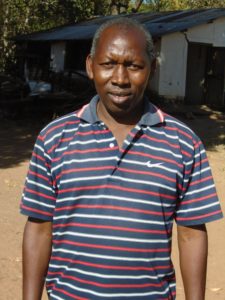
The field evaluation in Igombe was carried out on a voluntary basis by Paul Masimba, Managing Director of Community Development and Humanitarian Assistance (CODEHA), a Tanzanian NGO. Paul is thanked for his kind and valuable support.
He was assisted by Alphonce Kagezi, FSP Project Supervisor, Rev. Gadlord Deuli, Busega Scotland Project Leader and John Carney, Chairman, Busega Scotland, and involved sixteen women from the Igombe Women’s Group.
Background
The Family Support Project (FSP) was started in Igombe in June 2014. It followed an observation that many very vulnerable families in the town could not take advantage of conventional micro-credit schemes to establish small businesses to generate family finance. Such families can’t sustain sufficiently large businesses to meet loan and interest repayments. High levels of unemployment mean that small business is the economic mainstay of the community.
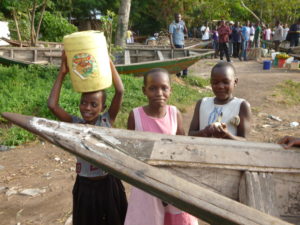
Igombe is a fishing town and as such has a transitory population, through fishermen and the transport industry. Consequently, HIV/AIDS has had a devastating effect, with many families losing one or both parents, and grandmothers often look after related, and sometimes unrelated, children. In late 2015 and early 2016 a cholera outbreak caused further deaths. Igombe has an estimated population of 32,000. In its two years of operation the FSP has supported 33 families with 125 children. There is no state support of poor families and typically Non-Governmental Organisations (NGO’s) provide such services.
The FSP is managed locally by a Project Supervisor in Igombe and the Busega Scotland Project Leader in Mwanza. The project has been designed in collaboration with a Steering Group, now consisting of the women beneficiaries themselves. Good support has been received from Ilemela District Council.
The funding for the FSP has come from two individual donors in Scotland, making regular payments, and one-off donations, principally from visitors to holiday accommodation in England.
The project has three components, which have been subject to evaluation:
Micro-grants and Family Payments
Health Insurance
Women’s Group
- Micro-grant Scheme
16 women attended for a normal meeting of the group. This is 50% of the women who have received micro-grants. All the women described their businesses and 8 explained the difference this had made to family life. All had received the 150,000/- capital sum.
| Name | Business | Progress |
| Tabu | Selling dried fish (dagaa) and charcoal | Two children at school. Rain had spoiled the dagaa and the business has been affected by reduced capital. |
| Helena | Selling charcoal and firewood. | |
| Sewena | Charcoal selling. | |
| Monica | Selling dagaa and then tobacco. | |
| Constancia | Selling dagaa and cultivating vegetable garden. | |
| Magdalena | Selling dagaa and milk. | Paying rent, buying mattresses and furniture. |
| Sabina | Selling dagaa and cultivating vegetable garden and rice field. | Bought furniture and beds. Better nutrition and children to school. Rice field bought from capital. |
| Salome | Selling firewood and hires help for her small farm (shamba). | Feeds children adequately and has built two rooms onto her house. |
| Veronica | Making and selling soup. | |
| Lucia | Selling firewood. | |
| Neema | Selling dagaa. | |
| Teresa | Hair salon. | Bought equipment and has more clients. Has moved to new salon. Children to school. Building house, bought television and radio. |
| Pendo | Selling fruit and making bricks. | Constructing house.
|
| Judith | Garment maker. | |
| Margaret | Vegetable selling. | Went well but sickness reduced capital. Bought plot for constructing house. |
| Rachel | Selling firewood. | Meeting family needs and constructing house. |
The women confirmed that other NGO’s in Igombe supported families affected by HIV/AIDS with treatment, nutrition and savings schemes.
Conclusions
- All the women agreed that the scheme had been beneficial.
- Some businesses had been affected by negative factors e.g. family sickness, rain damage to the dried fish, bad weather affected fishing and the recent cholera outbreak had closed businesses. Anything that draws on the women’s capital inevitably affects the business.
- Health Insurance Scheme
All the women said that they were aware of the scheme and had used it for themselves and/of their families. They understood that the Busega Scotland commitment was for one year and had been paying into a savings scheme (@500/- per week) through the group to cover next year. The main drawbacks of the scheme have been medicine not always being available at the hospital (and has to be bought) and staff changes causing confusion in administration. However, nobody had been refused free treatment. Nobody had been referred on for treatment at another hospital, so this aspect of the scheme has not been tested.
Conclusions
-
- All the women agreed that the scheme was beneficial.
- They will all subscribe for a second year (at their own expense) – the fee being negotiated with Karume Hospital is 15,000/- per family.
- Women’s Group
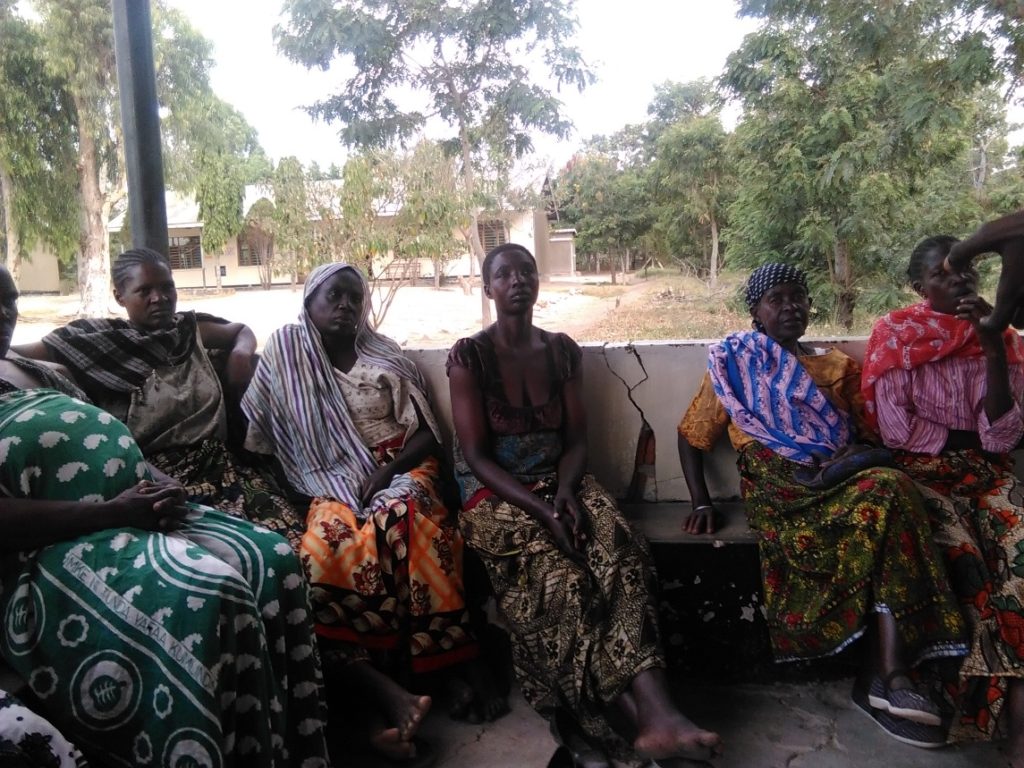
The women reported that it had 23 members. There is an attendance book but a constitution has not yet been developed. The organisation of the group has been affected by the transfer of the Community Development Officer (CDO) who was supporting the group. The main group activity has been the savings scheme or ‘Vicoba’.
Women pay 500/- towards educational costs every Monday along with 2,500/- ‘shares’ in the savings scheme. The scheme’s capital is then loaned to members (usually for business development and emergencies) at an interest rate of 10% per week over a maximum loan period of 4 months. Fourteen women have received loans.
The women are interested in a co-operative business but have not moved the idea forward, possibly because of the CDO’s absence. Brick making and flour milling were mentioned as ideas. They also said that the Vicoba was under-capitalised to meet demand. Members are also interested in further business (e.g. finance management and record keeping) and health education.
Conclusion
- The women have remained organised through difficult circumstances and said the group gave them solidarity through their challenges. They feel more respected as their economic position has improved.
Recommendations
- All three aspects of the Family Support Project (micro-grants, health insurance and women’s group) should continue.
- There is a need to clarify why all FSP beneficiaries are not group members and where possible re-engage women not currently involved.
- The priority at this stage is increasing the group’s capital to develop individual businesses.
- The group is not established or supported enough to take forward a co-operative business.
- There is a need to re-instate the educational aspects of the group.
In addition, a post-valuation review meeting took place on 30th May, involving Paul Mashimba, Rev Deuli and John Carney, which supported the above recommendations and, in addition, made the following.
- New beneficiaries need to be identified through Alphonce Kagezi and village officials and then ratified by the women’s group.
- The criteria for beneficiaries: not being able to manage micro-credit, permanent residents in Igombe, vulnerable families and responsible citizens.
- In respect of (2) & (3) above the two improvements should be linked to benefit all the women.
Subsequently, the recommendations were agreed by the Women’s Group for implementation.
Micro-grants Special Payments
In the May 2016 evaluation there were five women identified whose businesses had collapsed for various reasons. It was agreed with the Women’s Group that further grants should be paid to help re-establish the businesses, but with the following conditions:
- The grant is 50,000/- per beneficiary who will then pay 25,000/- into group funds after 6 months. This gives the group as a whole some benefit from the special payments.
- The recipients of special payments become/remain group members.
- If the group receives further capital from Busega Scotland then it will assume responsibility for special payments in the future.
The special payments have now been made.
Health Insurance Scheme
This has been successfully renegotiated to the satisfaction of the Women’s Group. The first year premium (paid by Busega Scotland) has increased from 17,000/- to 25,000/- but the subsequent premiums (paid by the families) reduced from 17,000/- to 15,000/-. The agreement will run for another year, when it will then be reviewed again.
FSP Development
The FSP has made progress over the last two years in Igombe. Two elements (the micro-grants and health insurance) are well established and an assessment was carried out by Paul Mashimba and Rev Deuli to see if the Women’s Group was established enough/had the potential to manage capital investment from Busega Scotland. The capital allows the women to develop their businesses by taking loans from the fund. The women would manage the group and loan scheme themselves, be supported by Paul Mashimba and Rev Deuli and Busega Scotland would receive periodic reports on its operation.
Chole
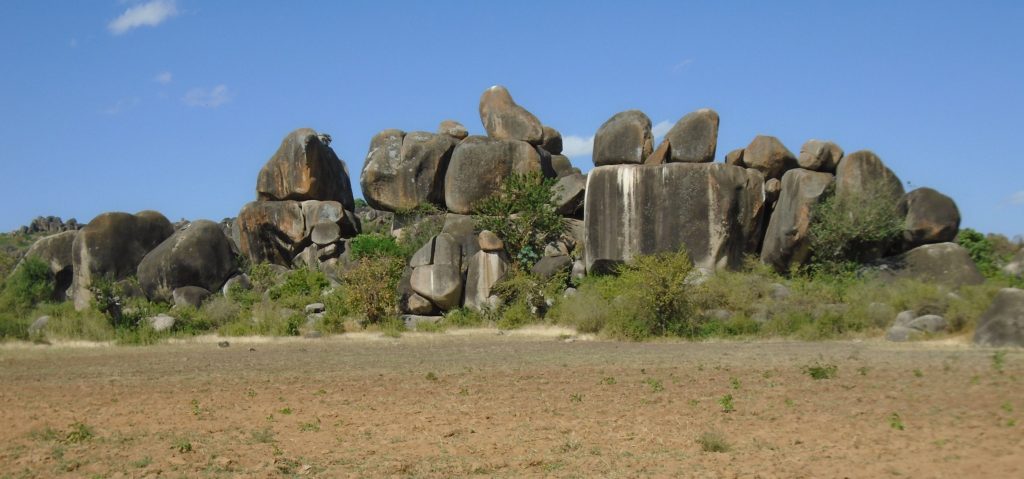 A second FSP site has been identified at Chole, in an area where CODEHA are already active. If the project goes ahead it will have a horticultural bias and involve an already established Women’s Group. The group could receive a capital grant from Busega Scotland and then, in a similar way to Igombe, the women could receive business loans. The possibility of a Health Insurance Scheme will be explored and CODEHA will be active members of the project.
A second FSP site has been identified at Chole, in an area where CODEHA are already active. If the project goes ahead it will have a horticultural bias and involve an already established Women’s Group. The group could receive a capital grant from Busega Scotland and then, in a similar way to Igombe, the women could receive business loans. The possibility of a Health Insurance Scheme will be explored and CODEHA will be active members of the project.
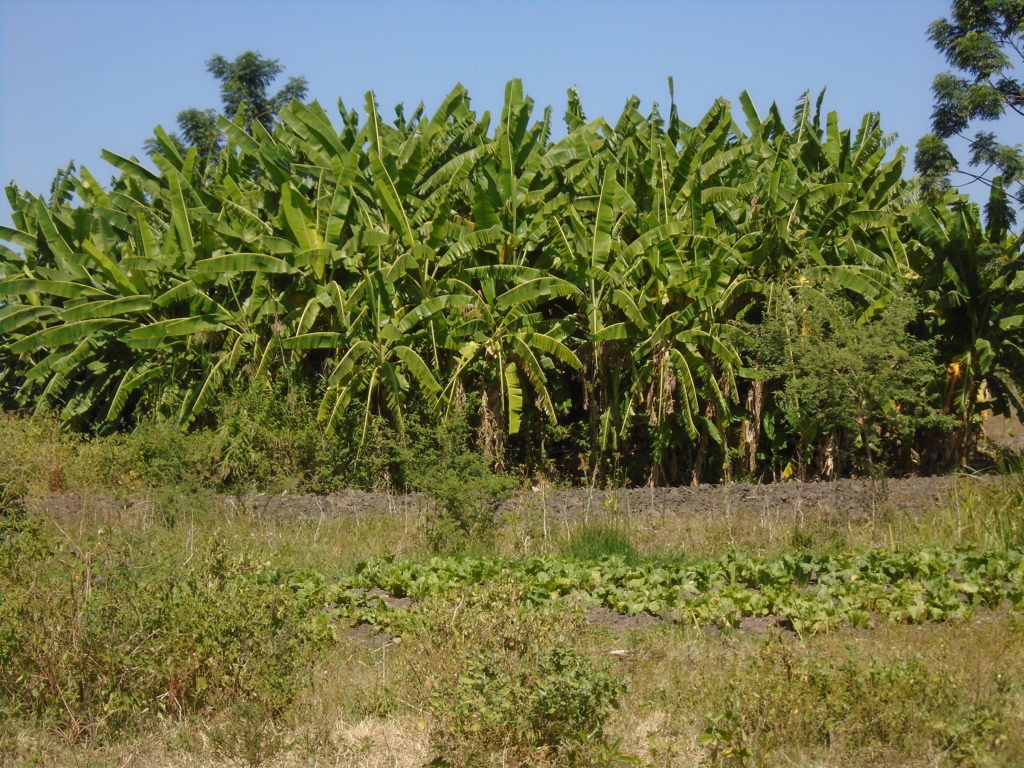
The Chole Agro-based Family Support Project will be governed by a project agreement:
Aim
To improve the wellbeing and health of vulnerable Chole families through working with the Chole Women’s Group.
Objectives
- To promote self-help and mutual support; by supporting, training, monitoring and providing capital for the group.
- To improve family income; by women starting or developing businesses through loans from the group.
- To improve the health status of the families; by health education and by negotiating a health insurance scheme.
Project Activities 2016/17
| ACTIVITY | DIRECT BENEFICIARIES | DESCRIPTION |
| Group Capital | 35 | A grant from Busega Scotland to start a Vicoba scheme.
The grant will be up to 1,000,000/-, depending on funding available. The minimum grant will be 250,000/-. The first women recipients will be identified by the group, in accordance with need. Each recipient will repay the loan, following group rules and procedures. CODEHA will facilitate the formation and development of the group. This will include women depositing savings at weekly meetings. |
| Assets | 35 | Women who have horticultural projects will receive free from CODEHA – seeds, watering cans and other inputs.
These inputs will include: 1. Access to a water pump and the use of a plough and oxen. 2. Fuel for the pump. 3. Maintaining the pump and the plough. |
| Health | 35 | CODEHA and Busega Scotland will seek to negotiate a suitable Health Insurance Scheme.
Busega Scotland will fund the scheme for each family for one year, as and when funds allow. CODEHA will arrange with Bukumbi Hospital for training on health and gender issues. For those families affected by HIV/AIDs, CODEHA will support referral to Bukumbi Hospital to allow testing, treatment and counselling. |
| Training | 35 | CODEHA and the Small Industrial Development Organisation (SIDO) will work together to deliver training on sustainable agriculture, group functioning, marketing, project management, saving for change and marketing and market linkages. |
| Support and Monitoring | 35 | These will be undertaken by Henry Zepheren (CODEHA Chole Field Officer) through monthly meetings.
Busega Scotland will seek to contribute financially to CODEHA training, support and monitoring costs. This will be by application from CODEHA and be subject to the availability of Busega Scotland funds. |
| Conference | 35 plus Igombe participants | CODEHA and Busega Scotland will consider, along with the women’s groups, the value and feasibility of organising a one-day conference for the groups to share experiences, ideas and plans. |
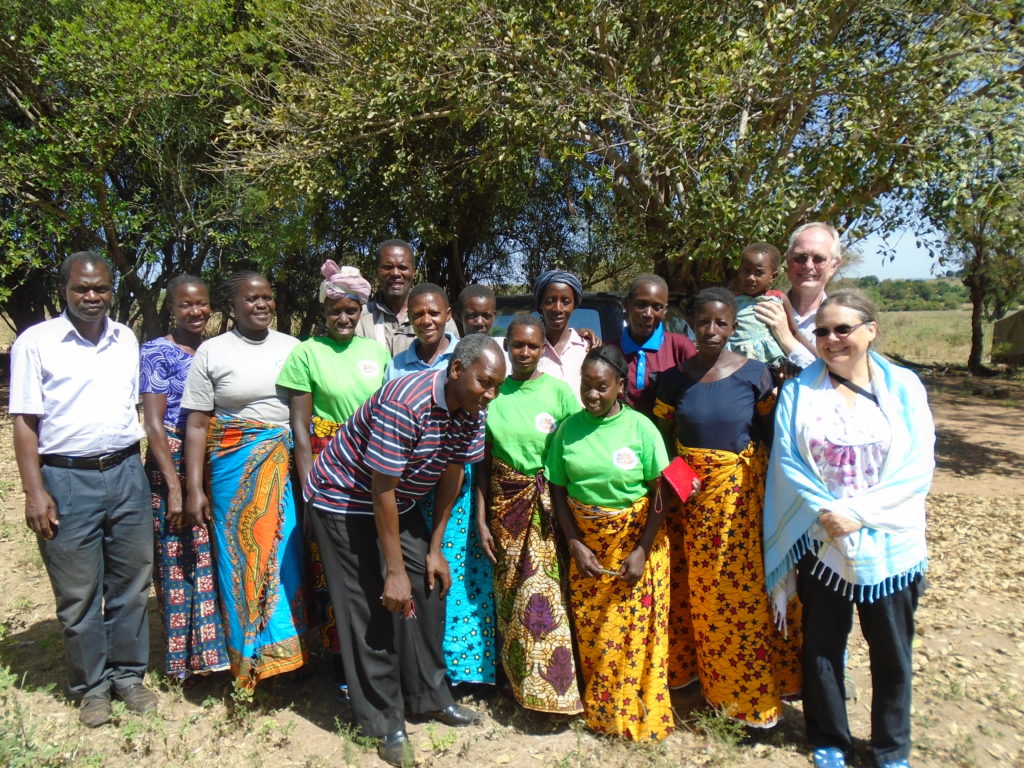
Busega Scotland Board Meeting 10th August 2016
The trustees agreed the following FSP developments, as part of Busega Scotland’s 2016/17 Development Plan.
- The Igombe project continues, with the same three components.
- To commence the Chole FSP, in partnership with CODEHA, and based on the project agreement.
- Two capital payments are made from Reserves to the Igombe Women’s Group (250,000/-) and Chole Women’s Group (250,000/-).
- As funding allows, the priorities for expenditure will be increased capital for the Chole Women’s Group, Chole health insurance and operational expenses across the two project
SEMINAR REPORT: 9th June 2016
Helping young people who have left orphanage care
Purposes of the seminar:
- To present research into employment problems faced by young people when they leave orphanage care.
- To report on the first year of operation of Busega Scotland’s Moving-on Project, which supports young people leaving Mayega Children’s Centre.
- To consider the question ‘How can services for orphanage leavers be improved?’
The seminar was facilitated by Paul Mashimba of Community Development and Humanitarian Assistance (CODEHA). Twelve people attended the seminar, representing NGO’s in Mwanza, churches and students who have left orphanage care.
Presentation by Julieth Godwin, Apprentice Busega Scotland on
Findings of the research on different orphanages in Mwanza city on employment problems facing different orphans as they finish their stay in orphanages
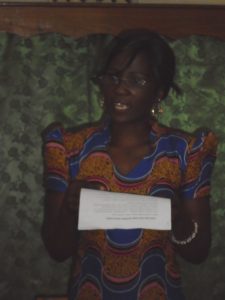
In her research Julieth concentrated on the problems young people from orphanages have in keeping their jobs. This was an issue for three of the four orphanages surveyed. Julieth identified five main reasons for this:
- Self-awareness – orphanage leavers have a poor self-image, do not recognise their potential and see themselves as an inferior group in society.
- Lack of preparation – coming from a closed environment orphanage leavers have little idea of the challenges they will face as young adults. They are unrealistic about this and when they experience the reality they find themselves losing hope and giving up.
- Cost of living – having come from situations where they do not budget for themselves or manage money, leavers underestimate how much they will need to earn to survive and struggle financially.
- Support systems – orphanage leavers lack the support of families and relatives, when this is needed, and have to meet challenges themselves. It is rare to find orphanages that provide support for their leavers.
- Acceptance – young people who leave orphanages are labelled as trouble makers and society sees them as having little value. They are not treated well and the emotional impact of this leads to a sense of isolation.
Julieth’s recommendations were considered in the third part of the seminar.
Presentation by Christine Carney, Trustee Busega Scotland on
The Moving-on Project
Christine said that the Moving-on Project was a response to the experiences of two Mayega leavers she first met in 2014. They were ill-prepared and poorly financed and supported at college in Mwanza. The project identifies four key areas for support:
- Educational
- Practical
- Social
- Emotional
There are currently eight young people in the project – three receive support through Rev Deuli, Busega Scotland Project Leader, and his family and five are in a residential college. The project aims to increase the aspirations and confidence of Mayega leavers and prepare them for a secure future.
The project has experience in transitioning leavers from Mayega but not in helping and supporting young people into employment.
A discussion on the challenges and solutions for the Moving-on Project took place in the last part of the seminar.
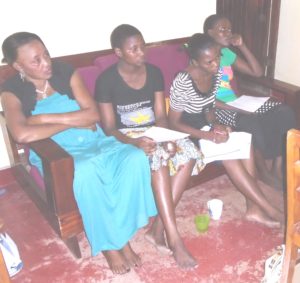
Open discussion facilitated by Paul Mashimba on
improving the services for orphanage leavers.
An open and enthusiastic discussion took place and the following were its recommendations and priorities (the first four come from Julieth’s research):
- There should be preparation for young people before they leave orphanage care to educate them on the challenges that will be faced. This recommendation was strongly supported by members of the Moving-on Project.
- This support should extend into the post-orphanage period when, for example, problems arise at college or in the workplace.
- Orphanages should budget for the needs of their leavers so that they can be supported financially until they are able to meet their own costs.
- Orphans should establish a ‘union’ where they can share their success stories and provide mutual support.
- Christine said that the two main challenges for Moving-on were improving the preparation of Mayega leavers and thinking through the support needs of the current students, as they leave college and look for work.
- Paul Mashimba said that he was so impressed by the seminar and Julieth’s research, that it should be repeated for a larger audience, including government officials.
John Carney – June 2016.
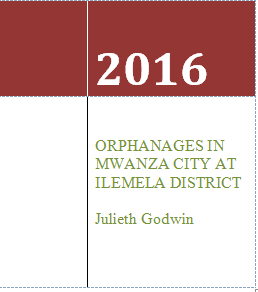 May 2016
May 2016
Findings of the research on different orphanages in Mwanza city on employment problems facing different orphans as they finish their stay in the orphanages.
INTRODUCTION
I, Julieth Godwin, one of the orphan who benefited from one of the orphanages by managing to receive all material and non material support from the orphanage till I become of age and level of living independent where I am supporting myself throughout life. I came with the idea of doing this research on the problems facing different orphans or young who come from difficult life as they become employed but fail to keep their jobs. It gets serious day by day and so I decided to conduct this research for the benefit of many who are from orphanages like me.
METHOD
I began my research by asking different supervisors of the four orphanages located in Ilemela District on this issue, also asked the orphans or young who come from difficult life who managed to keep their jobs and those who didn’t manage to keep their jobs.
I interviewed 4 staff and 8 young people who came from the centers in this research. The four different orphanages among which the three orphanage which are Amani girls home, Upendo Daima and Kuleana / COET appear to say the problem is existing in their orphanage for about 80% while the remaining one orphanage named Fenilsco Center says the problem doesn’t exist at all.
FINDINGS
Through my research I have discover several factors that appears to be the strongest on this problem facing the orphans especially those from different orphanage as most of them can’t real sustain in their jobs, leading even their fellows not to get jobs as their elders already presented a bad reputation in the organizations or institution that once offered them employment.
These are among the reasons that causes many of the orphans not to keep their jobs as expected:
-
- Self Awareness: Many of the orphans or young who come from difficult life they just don’t recognize who they are and the potentials they have as they see themselves as the inferior group in the society because of their background.
- Lack of Social Education : Orphans or young who come from difficult life reach youth stage with the little knowledge on different life challenges as they live in a close environment with very little interaction with the society as the society normal treat them as strangers thus they lack the reality of life that everyone outside the orphanage. Also, face challenge each day and so they go out to face life with higher expectations that it will be much easy and better than the orphanage while all that isn’t true at all thus find themselves losing hope and leave their jobs and going back to the streets or orphanage.
- Life Costs: Most of orphans or young who come from difficult life are raised with little awareness on different costs that life has to offer, as they live in the orphanage where all the costs are bear by the orphanage, so most of them lack the ability to manage things as individuals because each day they bear everything as a group and not as individual as the result when they reach a time to live independently, a lot come to them as surprises including the costs they have to bear each month as independent individuals including house rent and others like food and clothes
- Support System : Orphans or young who come from difficult life lack support system as other individuals who have families and relatives who are willing to offer support whenever necessary to their loved ones, but this is so different to them as they have to bear each and everything on their own after they become independent. Also its so rare to find an institution that deals in solving the problems facing orphans after they have become independent directly.
- Acceptance in the Society: Orphans or young who come from difficult life are referred as trouble makers and individuals who lack respect in the society as the result no one value them or even treat them in a good way as individuals from respectable family are treated, thus there is a very huge gap among them and other individuals in the treatment they receive from the society leading to emotional disappointments thus automatic isolation from the society in general.
- RECOMMENDATIONS
These are the few of the solutions provided by the interviewed on what should be done to solve this problem facing these orphans so they can keep their jobs and become full independent individuals:
- Support System: There should be institution or organization that will provide education and prepare these orphans or young come from difficult life as soon as they have finish their education to be full independent individual and ready to face all challenges life has to offer.It will help them to find job and to support young people to face any challenges.
- Also to keep their job when they get it and help to solve some problems when it happening at their work place.
- Funds from the Government and Donors: There should be a fixed amount of money in each orphanage from the government or donors that will support the orphans or young who come from difficult life who are ready to live independently in terms of capitals for those who want to self employ themselves and a little financial support for those who are about to be employed in terms of house rent and food for the first few months before they receive their salaries and become ready to bear all the costs with their salaries.
- Orphans Union : Also there should be a well established union of all orphans or young who come from difficult life who have succeeded in life so we all come together share our success stories and also our talents and knowledge so we lift each other and we all succeed in life.
- CONCLUSION: I wrote this report so that all that I have mentioned and explained in this report to be put in action for the benefit of all orphans or young come from difficult life from different orphanage so they can be helped in reaching their dreams and goals in life through their jobs with keeping their jobs while facing life in a new perspective.
- ACKNOWLEDGEMENTS: I would like to say thanks for everyone who was very co-operating with me till to success this research and all organization like Amani Girls home and Upendo Daima .i Always have been feeling is like my home place there at centers because the good co-operation and support you have giving me from the beginning. To COET and Fenilsco Centre thanks for being good to me to give good idea which it help me to success this research and all youth people/orphans from centres to agree to share together this idea which is going to help other youth people to keep their job when their find it. But the special thanks to Busega Scotland for being honest with me and to support me for every things till to success this research. Special thanks to John and Christine for giving me hope, and big support to me and my kids. God bless you glory to god because is father of all orphans forever
——————————————————————————
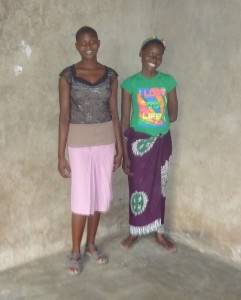
Moving On Project
Making an empty room a home February 2016
In January 2016 Jane joined Ester and Kabula living in Mwanza. The room rented by Ester and Kabula was cramped and much too small for three girls together. They needed to rent a bigger place!
Although their new accommodation is basic, the girls are living in the community, in the same standard of housing as everyone else.
Jane and Ester were first to look round. There is room for improvement but the girls saw the potential and were happy to move in. They were delighted to have more space and a large window.
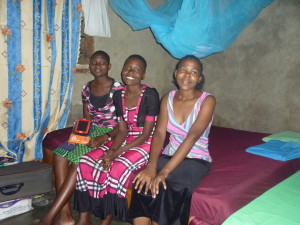
Once a curtain was purchased and their beds moved in, the place immediately seemed more homely.
Valerie Barrow enjoyed relaxing with the girls in the relative cool of the alleyway outside their home. There was a step to sit on!
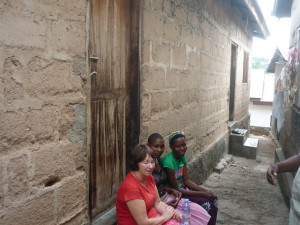
A shopping trip took place to buy basic furniture consisting of three plastic chairs and new mattresses were also needed. The girls carried their new mattresses on their heads up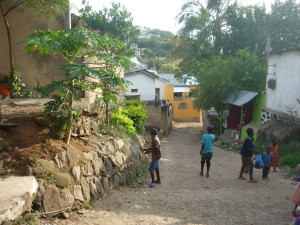 the steep hill that leads to their home. Other essentials included a charcoal stove, kitchen utensils and cutlery. Arnold also made sure the girls had a solar light. Their room has an electricity supply but there are frequent power cuts. Mosquito nets are in place to protect the girls as they sleep. There is a high incidence of malaria in communities on Lake Victoria.
the steep hill that leads to their home. Other essentials included a charcoal stove, kitchen utensils and cutlery. Arnold also made sure the girls had a solar light. Their room has an electricity supply but there are frequent power cuts. Mosquito nets are in place to protect the girls as they sleep. There is a high incidence of malaria in communities on Lake Victoria.
There is water outside at a standpipe and the girls have buckets and basins to do their washing. They use cold water and although soap powder is available bars of soap are cheaper and more practical. The same soap can be used for washing bodies as well as clothes. 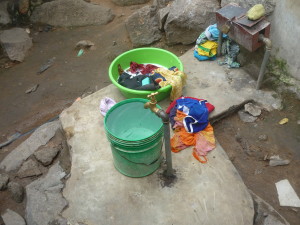
Cooking on a one “burner” stove means that meals are simple. Here the girls were cooking daga, small fish for their evening meal. Cooking takes place outside in the alleyway.
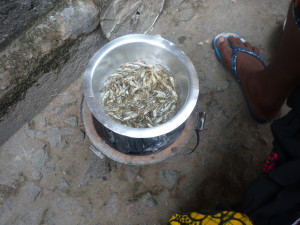
The life of the girls revolves around college, chores and church. Ester has begun evening classes with a view to resitting some national exams and improving her grades. Classes are conducted in English and this gives her more opportunities to practice and build her confidence.
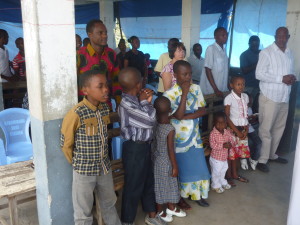 The girls have few social contacts outside of church. Ester and Kabula are members of their local Charismatic Episcopal Church of Tanzania choir. Their particular church meets on the roof top of a building however that building is due to be demolished to make way for road improvements.
The girls have few social contacts outside of church. Ester and Kabula are members of their local Charismatic Episcopal Church of Tanzania choir. Their particular church meets on the roof top of a building however that building is due to be demolished to make way for road improvements.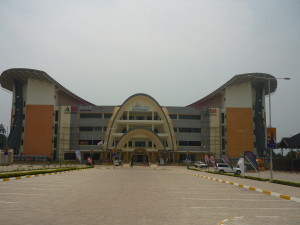
Chinese workers have been building a giant shopping Mall and the road is being widened due to the expected increased traffic. A few shops have now opened but are too expensive for our students to shop there. They will continue to go to the local market for their everyday needs.
Ester undergoes computer training as part of her teacher training course at Mwanza Polytechnic but computer time is very limited due to a lack of working equipment as well as electricity supply problems. There is usually no internet access for the students at college.
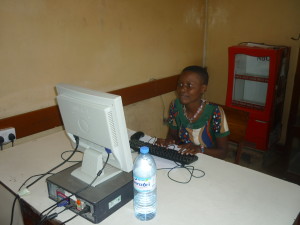
Kabula faces the same problems at her college and spends time on an old manual typewriter to improve her computer skills.
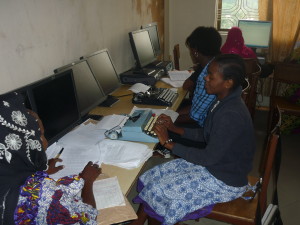 The girls do have access to a Busega Scotland computer at Rev Deuli’s house to practice on and again very limited internet access. Tanzanian internet access is by way of 3G mobile networks however people need money to buy credit.
The girls do have access to a Busega Scotland computer at Rev Deuli’s house to practice on and again very limited internet access. Tanzanian internet access is by way of 3G mobile networks however people need money to buy credit.
Despite the difficulties they face, the three girls are thankful to have training opportunities in Mwanza and the support of the Busega Scotland Project Leader. All of the young people in the Moving On project have spent many years living in the orphanage at Mayega.
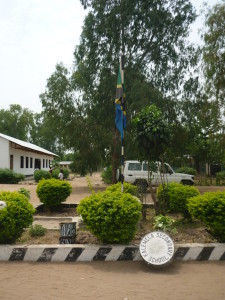
They have had a difficult start in life and a disjointed education. The circumstances of their admission to an orphanage have gone hand in hand with educational deprivation.
We believe that given a chance and proper support all our students can become an asset to their communities.
14.3.16
——————————————————
BUSEGA SCOTLAND
IGOMBE FAMILY SUPPORT PROJECT June 2015
June was a very important month for the Family Support Project (FSP) as three important parts of the project are now up and running.
- Micro-grant Scheme
- Women’s Group
- Health Insurance Scheme
The Micro-grant Scheme has been operating now for a little over a year and twenty-two women have benefitted so far. There is funding in place for a further fourteen grants, taking us through until May 2016.The scheme was developed following a Busega Scotland observation that very poor families are not able to take advantage of conventional micro-credit schemes because potential businesses were too small to meet capital and interest repayments. The FSP micro-grant covers an element for immediate family expenses (families have often run up debts) and a 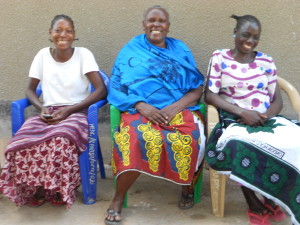 capital sum for business start-up. The total payment is approximately £50.
capital sum for business start-up. The total payment is approximately £50.
Three of the early grant recipients were interviewed at Igombe and asked about their businesses and the difference the scheme has made to their lives. Two of the women buy ‘daga’ (small fish from Lake Victoria) and sell it fresh, dried or smoked in the local market or door to door. One lady combines this with selling fresh fruit and the third woman is a charcoal vendor.
There are fourteen children in the three families and profits have been used to pay school fees and for improving diets. All three women said that that their lives were now less ‘hand to mouth’ but still their situation was precarious. The main concern was unexpected costs and ill health. This was explained as follows; if a woman becomes ill, and cannot work, then the income stream dries up and their limited capital maybe used for treatment and on household expenditure. This then reduces business capacity and the family’s fortunes go into reverse.
Despite this the women were very enthusiastic about the Micro-grant Scheme and the two new parts of the Family Support Project – the women’s group and health insurance. They saw possibilities of growing larger businesses, through group efforts, and while the health insurance scheme can’t prevent ill health, they said it can mitigate some financial impacts through free and prompt treatment.
There are many women wishing to receive micro-grants and five were 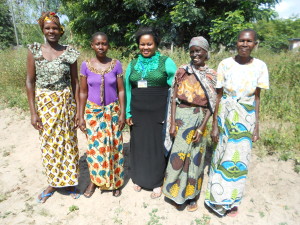 distributed in June. These five families have nineteen children, and as with the other three families, this includes grandchildren were parents have died (there is a very high prevalence of HIV and Aids in Igombe). Three of the women plan small market gardens to grow tomatoes, green vegetables and other crops. The capital grant will allow new varieties of seeds to be purchased, along with fertilisers and insecticides. One lady plans to collect, prepare and deliver firewood around food vendors and other locations in Igombe. The final business will be drying and selling daga.
distributed in June. These five families have nineteen children, and as with the other three families, this includes grandchildren were parents have died (there is a very high prevalence of HIV and Aids in Igombe). Three of the women plan small market gardens to grow tomatoes, green vegetables and other crops. The capital grant will allow new varieties of seeds to be purchased, along with fertilisers and insecticides. One lady plans to collect, prepare and deliver firewood around food vendors and other locations in Igombe. The final business will be drying and selling daga.
When asked how they will use their profits, all said for school fees and one woman said to pay for extra tuition. Better food and clothes were mentioned and two women want to improve their homes. One lady said that she had plans to buy a piece of land to build a house so avoid the payment of rent. This would not be the first time that a micro-grant beneficiary had purchased a plot of land from business profits.
It is very evident in talking to the women how their concerns, aspirations and hopes for the future are the same as for parents anywhere. When the Family Support Project provides an opportunity for greater prosperity then the women are willing to work hard to realise their ambitions. This is the basis of our partnership; between the families, project and donations through Busega Scotland. The decision to prioritise the formation of a women’s group, and to negotiate a health agreement with Igombe’s Karume Hospital, was made by the FSP Steering Group, having undertaken a cost-benefit analysis on a range of potential activities. Busega Scotland has been determined that the FSP be guided by local people and that the project is reflecting local needs and priorities.
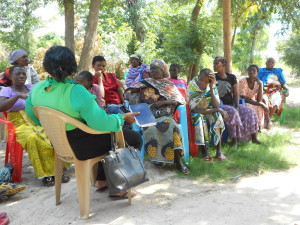 The Family Support Project Women’s Group is being delivered in conjunction with Tanzanian local government. The group facilitator is Matilda Mwita who has a lot of experience in guiding such groups in her role as Community Development Officer. The initial meeting attracted 15 women and the group was named Tushikikishane meaning ‘participation’. It was decided to have a single composite group for some activities and two geographically based sub-groups in Igombe and Kayenze Ndogu for other work (to reduce time and travel costs). The first meeting decided to invite all the women who had received micro-grants and also those on the list to do so – this means all the women are being given the same opportunities to participate.
The Family Support Project Women’s Group is being delivered in conjunction with Tanzanian local government. The group facilitator is Matilda Mwita who has a lot of experience in guiding such groups in her role as Community Development Officer. The initial meeting attracted 15 women and the group was named Tushikikishane meaning ‘participation’. It was decided to have a single composite group for some activities and two geographically based sub-groups in Igombe and Kayenze Ndogu for other work (to reduce time and travel costs). The first meeting decided to invite all the women who had received micro-grants and also those on the list to do so – this means all the women are being given the same opportunities to participate.
The group has commenced the following activities:
• A community bank or ‘Vicoba’ – this will involve the women making regular payments (and becoming shareholders) and loans can then be taken to improve their businesses and for education and health needs. A low rate of interest will be charged and profit shared at the end of each year, in line with the number of shares each woman holds. Matilda will also provide business development advice and guidance.
• The development of a community business – the first idea is to mill and enrich flour to be sold wholesale and retail, and can be used for porridge, baking etc. It is particularly valuable for people with Aids and HIV. The next step is for the group to produce a business plan and for Busega Scotland to support the project by selling ‘shares’ in the project with the prospect of social dividends for the families in Igombe.
• Health promotion – a course will be developed in collaboration with medical students from St Augustine University in Mwanza. The students are giving their time and expertise on a voluntary basis and will be using DVDs prepared in Swahili by Thare Machi, a UK charity. The curriculum will be determined by the women and the DVDs used to promote discussion and learning. The aim is for the FSP families to improve their health and wellbeing.
One benefit of group activities and self-help has manifested itself already.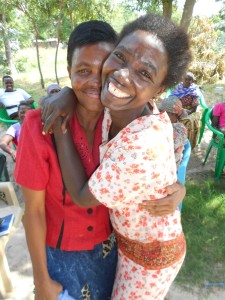 One member has suffered ill-health recently and her son broke his leg. This led to a decline in her business, through capital being used to cover health costs, and rent arrears. She and the family have been evicted. The group agreed a vicoba loan to get her business going again and another group member has offered free accommodation (she has space as her home has been extended using profits from her business – that itself was established through an FSP micro-grant).
One member has suffered ill-health recently and her son broke his leg. This led to a decline in her business, through capital being used to cover health costs, and rent arrears. She and the family have been evicted. The group agreed a vicoba loan to get her business going again and another group member has offered free accommodation (she has space as her home has been extended using profits from her business – that itself was established through an FSP micro-grant).
Busega Scotland has worked closely with two enthusiastic members of the FSP Steering Group, Alphonce Kagezi and Stella Ndallo, in developing and negotiating the Health Insurance Scheme. The Tanzanian government has been piloting a similar scheme in rural areas but Igombe, because of its proximity to Mwanza, is not included. However, Dr Shija Masoud, the Medical Officer at Karume Hospital, has the discretion to deliver health services in such a way as to meet local needs and was very receptive to working with Busega Scotland. The agreement is for:
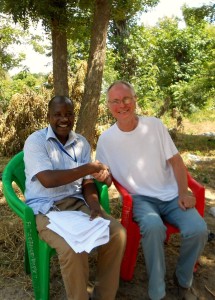 ‘Karume Hospital to provide free health care for identified families involved in the Family Support Project, and for this to be financed by Busega Scotland. This Health Insurance Scheme will include investigations, treatment, medicines and referral to other hospitals, for free treatment, including ambulance transport when necessary.’
‘Karume Hospital to provide free health care for identified families involved in the Family Support Project, and for this to be financed by Busega Scotland. This Health Insurance Scheme will include investigations, treatment, medicines and referral to other hospitals, for free treatment, including ambulance transport when necessary.’
Each family will receive a year’s insurance for a one-off fee paid by Busega Scotland. The fee is about £6 per family. The scheme will be reviewed after its first year of operation and, if successful and if FSP families so wish, the women can extend the cover themselves. It is possible that this could be paid for through vicoba profits.
These are exciting days for the Family Support Project as the women realise the benefits and potential of the project. It shows the possibilities that can arise when ‘seed corn’ funding is combined with local knowledge and expertise and communities are able to determine the way forward. Too often overseas organisations set agendas for their ‘partners’, the buy in is not really there and projects flounder. We are trying hard to avoid this outcome for the FSP.
John Carney.
FAMILY SUPPORT PROJECT – 2nd Report August 2014
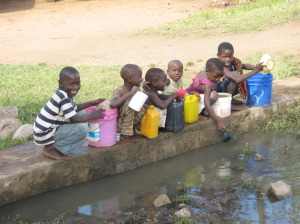 The first report on the Family Support Project (FSP) was prepared in March 2014. It highlighted the circumstances of families in Igombe who are living in extremely difficult circumstances. BCDSA Tz has a history of working in the town and has used its many contacts to establish a FSP Steering Group. A ‘project concept’ has been developed to provide integrated support to the ‘most vulnerable’ families, in an attempt to lift them out of chronic poverty and to improve their life chances. The Steering Group consists of local people, government officials and non-governmental organisations (NGOs). At its first meeting the needs of vulnerable families were identified and ‘theme co-ordinators’ appointed to report back on the improvements needed to provide more effective support. Local government officials, working with BCDSA Tz, also identified twelve families, and their fifty-eight children, for inclusion in the project. They are all single parent/carer families headed by mothers or grandmothers. Fathers have been lost to accidents, Aids or family breakdown and in some cases both parents are dead. The carers are then grandmothers or children move in with other families. The ‘project concept’ or ‘table model’ consists of three ‘legs’ sitting on ‘solid foundations’. It describes an integrated approach where different aspects of a family’s life need to be adequately addressed for the family and children to succeed. The legs are: good nutrition, good health and a good education. Women’s empowerment is so fundamental that it is part of the ‘foundations’ on which the ‘table’ sits, along with community involvement and community ownership. TABLE TOP – Most Vulnerable Children TABLE LEGS – Good Nutrition, Health and Education FOUNDATIONS – Women’s Empowerment and Community Involvement and Ownership The Steering Group agreed a ‘model of intervention’ – assessing a family’s needs, developing a care plan to meet those needs and agencies committing packages of support. The ‘theme reports’, commissioned by the Steering Group, led to the following being prioritised for action: Children’s Education
The first report on the Family Support Project (FSP) was prepared in March 2014. It highlighted the circumstances of families in Igombe who are living in extremely difficult circumstances. BCDSA Tz has a history of working in the town and has used its many contacts to establish a FSP Steering Group. A ‘project concept’ has been developed to provide integrated support to the ‘most vulnerable’ families, in an attempt to lift them out of chronic poverty and to improve their life chances. The Steering Group consists of local people, government officials and non-governmental organisations (NGOs). At its first meeting the needs of vulnerable families were identified and ‘theme co-ordinators’ appointed to report back on the improvements needed to provide more effective support. Local government officials, working with BCDSA Tz, also identified twelve families, and their fifty-eight children, for inclusion in the project. They are all single parent/carer families headed by mothers or grandmothers. Fathers have been lost to accidents, Aids or family breakdown and in some cases both parents are dead. The carers are then grandmothers or children move in with other families. The ‘project concept’ or ‘table model’ consists of three ‘legs’ sitting on ‘solid foundations’. It describes an integrated approach where different aspects of a family’s life need to be adequately addressed for the family and children to succeed. The legs are: good nutrition, good health and a good education. Women’s empowerment is so fundamental that it is part of the ‘foundations’ on which the ‘table’ sits, along with community involvement and community ownership. TABLE TOP – Most Vulnerable Children TABLE LEGS – Good Nutrition, Health and Education FOUNDATIONS – Women’s Empowerment and Community Involvement and Ownership The Steering Group agreed a ‘model of intervention’ – assessing a family’s needs, developing a care plan to meet those needs and agencies committing packages of support. The ‘theme reports’, commissioned by the Steering Group, led to the following being prioritised for action: Children’s Education
- To make sure all the children from the families are able to attend school ( having fees, uniforms, books etc).
- To work with schools to ensure they are doing all they can for the children.
- To ensure the children have a positive and achievable plan for when they leave school.
Health
- To seek baseline assessments for all the children to ensure their health and immunisation needs are identified and met.
- Work with the families to identify their health education deficits and develop a programme for these to be addressed.
- Ensure the families get their government health entitlements and that these are delivered in the most efficient way (eg health assessments for children affected by HIV to be delivered in Igombe).
- The families become part of the national Community Health Fund.
- All the children to get their birth certificates, if they don’t already have them.
- Ensure that the responsible teachers in schools regularly monitor the health and wellbeing of the children.
Nutrition
- To be addressed through improved, and secure, incomes for the families and education on how resources may be best used.
Women’s Empowerment
- A women’s group to be formed to fully understand their needs and those of their families, to provide support and education/training and consider self-help and collective action.
- The provision of business micro-grants/loans and the possibility of joining together to establish larger businesses.
Community Engagement
- The first step being to establish the women’s group referred to above.
- To convene a meeting involving the women, the current Steering Group and colleagues from the Health and Wellbeing Project so there is good integration of effort. One exciting and important link for the Family Support Project is with another BCDSA Tz initiative called the Health and Wellbeing Project (HWP). The HWP covers Igombe, and other areas in Mwanza Region, and is a partnership with local authorities, the University of Dodoma, Mzumbe University and the State University of New York at Albany. Our academic colleagues are Dr Stephen Nsimba, Dr Nicholas Kavanna and Professor Mansoor Kazi. The Health and Wellbeing Project is wide ranging and consists of two parts:
- Action research
- Health education and curative actions to address health and wellbeing needs.
The action research element will assess the health and wellbeing needs of ‘most vulnerable children’ and their families, devise and implement innovative strategies to address the identified needs and to evaluate their impact. Baseline screening is essential before any intervention, to avoid presumptive treatment or social action. The baseline screening approach applies to health education and treatment programmes and to social welfare interventions. It includes an understanding of local social and cultural norms to ensure that work with communities is most effective. For example, it is recognised that health screening attendance can be very good but compliance often reduces when interventions are put in place if they don’t reflect the particular circumstances in which they are being delivered. Clinical and social research that commences with the screening of local knowledge, attitudes and practices is an established and academically accepted approach. Issues that may emerge for intervention in the HWP could include access to treatment and immunisation, availability of clean water, female genital mutilation, domestic and sexual violence, forced marriage, drug misuse and HIV, malaria and bilharzia transmission. The HWP research methodology is innovative in spanning both health and wellbeing issues. The ambitious aim of the project is to develop a straightforward action orientated research method that can be scaled up and used by communities to assess their own health and wellbeing needs, in both Tanzania and across Africa. The accurate assessment of need is an essential pre-requisite for appropriate and cost effective action. To describe the needs of a community in a prioritised and integrated manner provides the best opportunity for effective self-help and also to obtain targeted support from helping agencies, both governmental and non-governmental. But now back to the Family Support Project in Igombe. As well as the establishment of the Steering Group, and agreeing the ‘project concept’, there has been actual progress in implementation. Two supporters in Scotland have made lump sum and pledged monthly donations to establish a Micro-grant Scheme, within the Women’s Empowerment theme of the project. This has allowed five micro-grants (about £40 each) to be made to families along with £20 subsistence payments, while the women establish their businesses. All of the women have started fish selling. They buy from the fishermen on Lake Victoria. Some fish is sold fresh in Igombe and some is dried for selling in the market, or to fish traders who take it Mwanza and further afield. One family has used part of their grant to buy a pregnant goat, that they will breed from and establish a herd for selling future offspring. The women have asked local BCDSA Tz staff to pass on thanks to micro-grant donors and say the businesses are an opportunity to put food on the table and to help their children go to school. Micro-finance is regarded by the Igombe Steering Group as a major underpinning of the Family Support Project, as it can help provide financial stability for the families. The plan is to involve the women in the Steering Group so that they are at the heart of project development and also to establish a Support Group to promote self-help, education, training and collective action. For example, women joining together may be able to develop larger, and more profitable, businesses than working alone on separate initiatives. Looking ahead a number of priorities have emerged for the Family Support Project both in Tanzania and Scotland. These include:
- Inviting the women to join the Steering Group and the establishment of a Support Group.
- Issue more micro-grants (currently at a current rate of one per month but this could be increased with additional resources).
- Look to involve the families in the national health insurance scheme.
- The Steering Group to ensure the families are receiving all available government services and entitlements (including their children’s birth certificates).
- Seeking further local and overseas funding (an application is being made to the Human Development Innovation Fund) and support for the project (including a partner institution in UK).
The Family Support Project is in its early days but has many exciting and positive characteristics. It is a grassroots project, it seeks holistic support for the ‘most vulnerable’ families and there is academic input to ensure that new ideas inform its development. Busega Scotland is planning fund raising events but we would welcome contact from any supporters that are able to make a one-off or monthly donations and even small amounts do add up! Please contact us if you can help. Thank you. John Carney August 2014
FAMILY SUPPORT PROJECT FIRST REPORT MARCH 2014 BCDSA TZ established HIV/Aids and Malaria Projects in 2007 and a WAZA Project in 2009. The WAZA Project has supported children from vulnerable families to attend school and the health project offered preventive education and home-based care to victims. The projects have been interrelated but in order to provide a more holistic service they will be combined in 2014 into family support, as we seek to re-focus and expand as a single, integrated project. The ability for children to learn at school is influenced by many factors. Up until now WAZA has provided school fees, uniforms etc. but has not consistently addressed other issues such as the impact of HIV/Aids within the family, general health issues, nutrition and the quality of education and attainment of the children. We feel that without addressing all these issues in a comprehensive manner the life chances of some of our most vulnerable children will not be maximised. A recent visit to Igombe emphasised the need for an organised, focused and well financed family support project. Igombe is a small fishing town some 25 km west of Mwanza. A recent estimate of vulnerable children put the figure at about 1100. Igombe has suffered greatly from HIV/Aids, as is common with many fishing communities on Lake Victoria. The majority of the five families visited have been affected in one way or another by the disease. We are indebted to the families for making their difficult circumstances known through this report. Clearly they, and many other members of their community, are in need of additional support to achieve a basic standard of care and education for their children. BCDSA TZ Family Support Project wants to be in the frontline in helping such families with the numerous problems they face. This willingness to share personal details was backed up by Mr Alphonce Kagezi, the BCDSA TZ Supervisor in Igombe, who is himself HIV+. Mr Kageze was happy for readers to know of his infection so as ‘to caution people from across the world‘. He has committed his life to working with poor families and in tackling the stigma and scourge of HIV/Aids. It is through staff like Mr Kageze, living and working in the community, that BCDSA TZ can make a real difference. 2 Leya (68 years) is caring for three orphaned grandchildren and two other orphaned children. Only three are able to go to school. She has no one to help her and tries to eke out a living by growing maize and beans on poor land she begs from the community. She has no surplus to sell. One child is HIV + and receives treatment through a home-care project. The family sleep on the earth floor. Leya pays £4 rent per month for their home but now cannot find the money for school uniforms, shoes and exercise books. At £20 for each child it is beyond her means. Abella lost her husband in a mining accident and works to support her four children by running a small catering business, started through a BCDSA TZ micro-credit loan. She finds it hard to work and care for the children. Normally the family have just one meal a day. Sometimes Abella fails to find money for food and cannot earn enough for everything the children need to go to school. One child was sent home recently because he did not have shoes. The children are in good health apart from the usual bouts of malaria. Their room is 12ft. x 12ft., divided into a living and sleeping area with a curtain and the family sleep on one mattress under a mosquito net. 3 Saumu is a 53 year old HIV widow with four of her own children and three other orphans to care for. She has no one to help her support the children. She leaves home at 5 am to go to the lake shore, a 4km walk, to try to get daily labour carrying fish. Sometimes she gets no work. When that happens she has no food for the children. The children are left alone while she is away and she worries that they are not safe. One child is in the WAZA project. The family have one mattress and a mosquito net that the younger children share. The older ones sleep on reed mats. In common with the other families in his report there is no proper sanitation – on the left is the bathroom and the toilet is on the right. 4 Yasmita, 14, and Dina, aged 12, live with their 66 year old widowed grandmother, TABU. The children’s father died in 2006 and their HIV+ mother ran away to seek help from a witch doctor. She never returned. The girls are very bright, doing well at school but have been absent due to a lack of exercise books. They needed about £16 for the books and examination fees. A fortune when you have so little. The children share a thin piece of foam to sleep on the floor at night. The warmth of their relationship with each other was very evident. Their disabled grandmother said she was doing all she could to give the girls a good life but she was old and could not work to support them. Margaret is a 39 year old HIV+, AIDS widow with five children. The children have not been tested but one is often sick. The three older ones used to go to school but have not been for over a year, as they have no uniforms or shoes. The family had no food and ate only maize the previous day, provided by a neighbour. Their home is one 8ft. by 6ft. room with no window. The family sleep on a slatted bed base, without a mattress, or on a maize sack on the dirt floor. They have one sheet between them and no other furniture. Margaret rents the room for about £1.60 per month. She used to sell vegetables but this is beyond her now and she is on a course of anti-viral medication. Mr Kagezi, from BCDSA TZ, keeps in touch with the family but has no resources to really help them. BCDSA TZ has the knowledge, experience and motivation to help the families mentioned in this report but they are not alone in needing our help. In Igombe we would like to work with local leaders, the community welfare officer and citizens, to develop an integrated project that can make a real difference, and become a model for community-based intervention elsewhere. To do this we need sustained and predictable funding, that will allow us to plan for the longer term and avoid families receiving the piecemeal and temporary support so evident in this report. March 2014.

